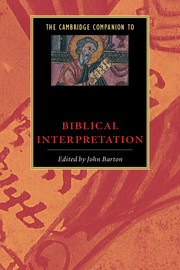Book contents
- Frontmatter
- Introduction
- Part 1 Lines of approach
- Part 2 Biblical books in modern interpretation
- 12 The Pentateuch
- 13 The historical books of the Old Testament
- 14 The prophetic books
- 15 The poetic and wisdom books
- 16 The Synoptic Gospels and Acts of the Apostles Telling the Christian story
- 17 John and the Johannine literature The woman at the well
- 18 The Pauline Letters
- 19 The non-Pauline Letters
- 20 Apocalyptic literature
- General Index
- Index of Biblical References
15 - The poetic and wisdom books
from Part 2 - Biblical books in modern interpretation
Published online by Cambridge University Press: 28 May 2006
- Frontmatter
- Introduction
- Part 1 Lines of approach
- Part 2 Biblical books in modern interpretation
- 12 The Pentateuch
- 13 The historical books of the Old Testament
- 14 The prophetic books
- 15 The poetic and wisdom books
- 16 The Synoptic Gospels and Acts of the Apostles Telling the Christian story
- 17 John and the Johannine literature The woman at the well
- 18 The Pauline Letters
- 19 The non-Pauline Letters
- 20 Apocalyptic literature
- General Index
- Index of Biblical References
Summary
Any critical interpretation of the poetic books of the Hebrew Bible is dependent, or certainly should be dependent, on an understanding of the distinctive character of biblical poetry. On this question there has been less of a consensus than one might have expected at this late date in modern biblical studies. Broadly speaking, I would say that the investigation of biblical poetry since the beginning of the 1980s has made some real if uneven advances, against an unfortunately persistent background of confusions, misperceptions and aridly academic overcomplications.
The notion that biblical poetry is organized on a parallelism of meaning and structures between the two - sometimes three - parts of a line was first systematically articulated by Robert Lowth in his Lectures on the Sacred Poetry of the Hebrews, originally published in Latin in 1753. Though the first two of his three categories of parallelism - synonymous and antithetical - are demonstrably operative in thousands of lines of biblical verse, his third category, 'synthetic parallelism', would come to seem in the eyes of many critics no parallelism at all, leading to some uneasiness with the theory as a whole. In the course of time, scholars would propose the most intricate varieties of sub-categories of parallelism in order to save the system, and, in the opposite direction, especially beginning in the 1970s, counter-systems would be put forth that relegated parallelism to a purely secondary role. Thus, syllable-count, sentence-types, syntax, musical quantity, thought-unit were each in turn promoted by various scholars as being the real organizing principle of biblical poetry. None of these theories has won general acceptance, and each, I believe, can be shown to be compromised by either internal contradictions or some basic misunderstanding of how poetry works.
- Type
- Chapter
- Information
- The Cambridge Companion to Biblical Interpretation , pp. 226 - 240Publisher: Cambridge University PressPrint publication year: 1998



